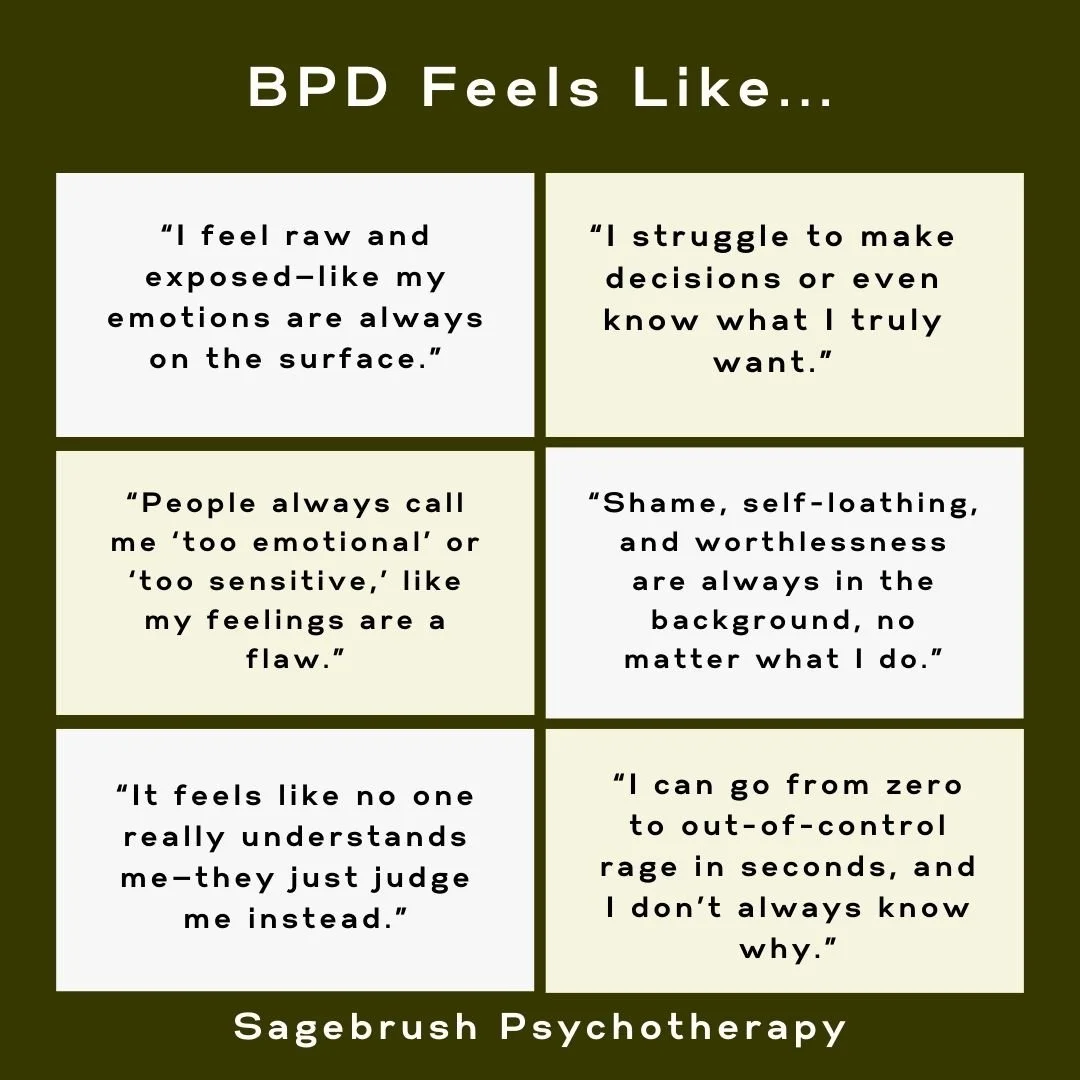Borderline Personality Disorder Los Angeles:
Specialist for BPD Treatment
Treating Borderline Personality Disorder in Los Angeles
If living with Borderline Personality Disorder (BPD) feels overwhelming, painful, or isolating—you’re not alone, and we see you. Many people with BPD struggle to manage intense anger, sudden mood swings, and difficulty regulating emotions. These emotional highs and lows can lead to impulsive behaviors, suicidal thoughts, and ongoing relationship challenges. Over time, daily life may begin to feel consumed by distress, a distorted self-image, or dangerous coping strategies like spending sprees, substance use, or unsafe sex. Whatever you're experiencing, healing is possible—and we’re here to help you take the next step.
How we treat BPD: Validation and Acceptance
At Sagebrush Psychotherapy, our therapists are committed to providing a safe space for individuals navigating the challenges of Borderline Personality Disorder (BPD). We know that shame often accompanies BPD traits, and we’re here to break that cycle. Our approach in treating Borderline Personality Disorder is rooted in the belief that healing begins when shame is replaced with acceptance and hope. We work to validate your experience because we know your emotions are real and understandable. Our team of mental health professionals is dedicated to providing compassionate and effective care for those with BPD.
How we treat BPD: Evidence-Based Treatments
Our mental health professionals specialize in two evidence-based treatments that have proven effective in treating Borderline Personality Disorder. These treatments can be tailored to meet the individual’s specific needs and circumstances:
Dialectical Behavior Therapy (DBT): A behavioral therapy approach that helps individuals develop strategies to manage emotions, behaviors, and relationships. It is particularly effective in addressing emotional instability and impulsivity. DBT also employs behavioral techniques to modify unhelpful behaviors. Learn more about DBT for BPT treatment here.
Schema Therapy: This integrative therapy combines elements of cognitive-behavioral, psychodynamic, and attachment-based approaches to address deep-seated patterns of thinking and behavior. Schema Therapy helps individuals recognize and modify maladaptive schemas—core beliefs developed in childhood that contribute to emotional dysregulation and relationship difficulties. By reworking these schemas, individuals can develop healthier coping strategies and a more positive self-image.
Understanding Borderline Personality Disorder
Borderline Personality Disorder is a mental health condition characterized by intense emotional instability, impulsive behaviors, and challenges in maintaining healthy relationships. A BPD diagnosis is recognized by the in the Diagnostic and Statistical Manual (DSM 5-TR), which was developed by the American Psychiatric Association to diagnose and understand mental health conditions. BPD symptoms include:
Emotional Instability: Intense emotions that can shift rapidly, often described as feeling like being on an emotional rollercoaster. Some people describe having intense mood swings. One moment intensely happy and the next filled with anger.
Fear of Abandonment: An intense fear of being left or rejected, leading frantic efforts to avoid abandonment. Examples include excessive texting, pleading, or pushing people away preemptively.
Unstable Relationships: A pattern of relationships that swing between extremes of idealization and devaluation.
Impulsive Behaviors: Actions such as reckless spending, reckless driving, binge eating, risky sexual activities, or substance abuse as a way to cope with emotional distress. These behaviors often have long-term consequences, leading to further guilt or regret.
Unstable identity: Individuals may feel unsure about their goals, values, or who they are as a person. This can lead to feelings of emptiness or a lack of direction.
Self-Harming Behaviors and Suicidal Ideation: Many individuals with BPD engage in self-harm or experience recurring thoughts of suicide, often as a way to manage overwhelming emotions or feelings of worthlessness.
Chronic Feelings of Emptiness: A pervasive sense of numbness or void that can feel unbearable, leading to attempts to fill this emptiness through external validation or risky behaviors.
These symptoms are often misunderstood, leaving those with Borderline Personality Disorder feeling isolated or stigmatized. Our goal is to help clients understand their symptoms, develop tools to manage them effectively, and build a life that feels stable and fulfilling. If you are wondering whether this might be you consult with one of our mental health professionals to learn more.
Borderline Personality Disorder Treatment
Dialectical Behavior Therapy (DBT) for BPD Treatment
Dialectical Behavior Therapy (DBT), a form of talk therapy, is widely recognized as an effective treatment for personality disorders. It is an evidence based treatment that addresses emotional instability, impulsive behaviors, and interpersonal challenges. DBT equips individuals with practical tools to build a more balanced and fulfilling life. Sagebrush Psychotherapy offers DBT Skills group therapy and individual therapy.
DBT Skills groups components:
Mindfulness:
Mindfulness helps clients stay present in the moment and observe their thoughts and emotions without judgment. For those with BPD, mindfulness reduces emotional reactivity and fosters greater self-awareness, allowing clients to respond intentionally rather than impulsively.
Emotional Regulation:
This module focuses on understanding and managing strong emotions. Clients learn techniques to reduce emotional extremes and create a sense of balance, such as identifying triggers, reframing negative thoughts, and using grounding strategies during emotional peaks.Distress Tolerance:
Distress tolerance skills are essential for coping with crises without resorting to self-harm, substance use, or other destructive behaviors. Techniques include distraction, self-soothing, and radical acceptance to help clients navigate painful situations with greater resilience.Interpersonal Effectiveness:
Relationships often pose significant challenges for individuals with BPD. This module teaches effective communication, conflict resolution, and boundary-setting skills, empowering clients to build healthier and more stable relationships.
Co-Occuring Disorders
Many people with BPD also experience conditions like Post Traumatic Stress Disorder, anxiety, mood disorders, or eating disorders. These overlapping issues can make treatment more complex, which is why we take an integrated approach. We focus on understanding how these conditions interact, and tailor treatment to address you individual concerns like trauma symptoms, severe dissociative symptoms, and eating issues. Your treatment plan may involve coordination with prescribing doctors, nutritionists, and other providers.
What Individual Therapy Looks Like in DBT
In weekly one-on-one sessions, the BPD therapist and client work together to address specific challenges, apply DBT skills to real-life situations, and explore the root causes of distress.
A key component of therapy in DBT is behavioral chain analysis, a process where clients examine situations where they acted impulsively or struggled to manage emotions. By identifying triggers, thought patterns, and resulting behaviors, clients gain insight into how their responses develop and learn alternative ways to handle similar situations in the future.
Therapists also use these sessions to help clients set meaningful goals and track their progress. Sessions are highly collaborative, and therapists provide consistent feedback, encouragement, and accountability.
Our BPD therapists in Los Angeles, are committed to providing a supportive, structured environment where clients feel empowered to make lasting changes. By combining individual therapy with skills training and ongoing practice, DBT offers a comprehensive path to healing and emotional stability.
Borderline Personality Disorder (BPD) in Men
Borderline Personality Disorder is often misunderstood, and this is especially true when it comes to men. BPD has a prevalence rate of up to 1.6% and is more frequently diagnosed in females. Unfortunately, men with BPD are often misdiagnosed or overlooked, leaving them without the support and treatment they need.
Men with BPD may express their emotional struggles in ways that align with traditional masculine norms, such as:
Anger and Aggression: Instead of openly showing sadness or vulnerability, men may express their emotional pain through anger, irritability, or outbursts. This can impact their work and interpersonal relationships.
Substance Use and Risk-Taking Behaviors: Men may turn to alcohol, drugs, or reckless behaviors as coping mechanisms to numb feelings of emptiness or emotional instability.
Difficulty with Emotional Expression: Societal expectations often discourage men from expressing vulnerability, leading to suppressed emotions and increased inner turmoil.
Relationship Challenges: Fear of abandonment may manifest as controlling behavior, withdrawal, or rapid shifts between idealizing and devaluing partners.
The stigma surrounding mental health, combined with societal pressures to appear stoic, often prevents men from seeking therapy for BPD. At Sagebrush Psychotherapy, we are committed to breaking this cycle by creating a safe, supportive environment where men can explore their emotions and experiences without fear of judgment. We work to address the unique challenges men face while empowering them to embrace their emotions and build fulfilling lives.
Building a Therapeutic Relationship with your Borderline Personality Disorder Therapist
For those with Borderline Personality Disorder (BPD), therapy isn’t just about coping skills—it’s about building a trusting, stable relationship that fosters healing. Many people with BPD have been hurt in relationships, feeling abandoned, judged, or misunderstood. When we treat BPD we focus on providing a safe, consistent space where you can be yourself without fear of rejection.
Addressing Abandonment Fears
A deep fear of being left can make trust difficult. Therapy helps build a reliable, secure connection, easing these fears and serving as a model for healthier relationships.
Overcoming Fear of Judgment
Many with BPD worry about being “too much” or having their emotions dismissed. Our non-judgmental environment allows you to express yourself freely, helping you gain confidence in your emotions.
Finding Stability in Relationships
BPD can make relationships feel like an emotional rollercoaster—idealizing someone one moment and feeling disappointed the next. Therapy helps you recognize these patterns and develop more balanced, fulfilling connections.
Practicing Relationship Skills
Therapy is a safe place to practice setting boundaries, expressing needs, and managing emotions in real-time, giving you tools to navigate relationships with confidence.
Family and Partner Support
Borderline Personality Disorder can be challenging not only for the individual with the condition but also for their loved ones. Family and friends may struggle to understand the condition and may feel helpless in terms of how to support.
Some suggested books:
Loving Someone with Borderline Personality Disorder by Shari Manning
The High-Conflict Couple: A Dialectical Behavior Therapy Guide to Finding Peace, Intimacy, and Validation by Alan Fruzzetti
The Power of Validation: Arming Your Child Against Bullying, Peer Pressure, Addiction, Self-Harm, and Out-of-Control Emotions by Karyn Hall and Melissa Cook
Involving important people in the healing process is often a valuable part of treatment for Borderline Personality Disorder. Beyond books, family therapy provides a structured space to strengthen communication, set healthy boundaries, and reduce conflict. By helping loved ones better understand the condition and actively participate in the therapeutic process, individuals with BPD can build a more supportive environment and improve their overall well-being.
Therapy for Borderline Personality Disorder Frequently Asked Questions
-
While there’s no single “cure” for Borderline Personality Disorder (BPD), it is absolutely treatable—and people with BPD can get better. With evidence-based therapies like DBT and Schema Therapy, many people experience lasting relief from symptoms like intense anger, impulsivity, and unstable relationships. Treatment focuses on building emotion regulation skills, improving daily life, and creating meaningful change over time.
-
Research suggests Borderline Personality Disorder develops from a mix of biological factors, life experiences, and social influences. Factors like childhood trauma, such as neglect or abuse, are often linked to a higher risk of developing the condition. Working with therapists who specialize in treating BPD will ensure that you address these different components.
-
Borderline Personality Disorder is diagnosed more frequently in women, but research indicates this may not mean the condition is actually more prevalent among women. Men with BPD are often underdiagnosed or misdiagnosed, as their symptoms can manifest differently, such as through anger, aggression, or substance abuse, which may lead to other diagnoses. While the diagnosis rates differ, BPD can affect people of all genders equally.
-
Trauma, particularly during childhood, is closely linked to the development of Borderline Personality Disorder. Many individuals with BPD report histories of adverse experiences, such as emotional, physical, or sexual abuse, neglect, or abandonment. These early traumas can disrupt emotional development, impair the ability to form secure attachments, and contribute to intense fear of abandonment or instability in relationships.
While not everyone with BPD has experienced trauma, it is a significant risk factor, and understanding this connection is essential in providing effective, trauma-informed treatment.
Starting BPD Treatment in Los Angeles
If you’re looking to start BPD treatment in Los Angeles, Sagebrush Psychotherapy offers a compassionate, evidence-based approach tailored to emotional regulation, impulsive behaviors, and relationship struggles. Our therapists specialize in DBT and trauma-informed care, providing both individual therapy and skills training to help you navigate intense emotions and build a fulfilling life. At Sagebrush Psychotherapy, we understand that living with BPD can feel overwhelming, which is why we emphasize validation, coping skills, and meaningful personal growth. Whether you’re experiencing mood instability, self-destructive behaviors, or difficulties in relationships, we’re here to support you every step of the way. Start your healing journey with us and learn how to create a life that feels more stable, connected, and fulfilling.









